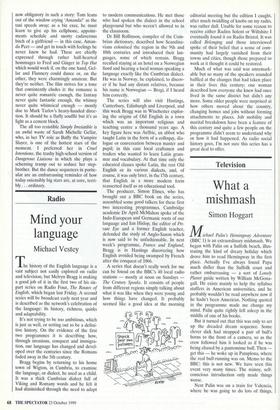Radio
Mind your language
Michael Vestey
The history of the English language is a vast subject not easily explored on radio and television, but Melvyn Bragg is making a good job of it in the first two of his six- part series on Radio Four, The Routes of English, which began last Friday. A second series will be broadcast early next year and is described as the network's celebration of the language: its history, richness, quirks and adaptability.
It's not trying to be too ambitious, which is just as well, or setting out to be a defini- tive history. On the evidence of the first two programmes it is describing how, through invasions, conquest and immigra- tion, our language has changed and devel- oped over the centuries since the Romans faded away in the 5th century.
Bragg begins by returning to his home town of Wigton, in Cumbria, to examine the language, or dialect, he used as a child. It was a thick Cumbrian dialect full of Viking and Romany words and he felt it had diminished through the need to adapt to modern communications. He met those who had spoken the dialect in the school playground but who weren't allowed to in the classroom.
Dr Bill Rollinson, compiler of the Cum- brian dictionary, described how Scandina- vians colonised the region in the 9th and 10th centuries and introduced their lan- guages, some of which remain. Bragg recalled staying at an hotel on a Norwegian fiord and hearing a local woman speaking a language exactly like the Cumbrian dialect. He was in Norway, he explained, to discov- er if he had any distant relatives, because his name is Norwegian — Bragi, if I heard him correctly.
The series will also visit Hastings, Canterbury, Edinburgh and Liverpool, and this week Bragg was in Winchester explor- ing the origins of Old English in a town which was an important religious and teaching centre a thousand years ago. A key figure here was Aelfric, an abbot who taught Latin in the form of a colloquy, dia- logue or conversation between master and pupil; in this case local craftsmen and traders who wanted to learn Latin gram- mar and vocabulary. At that time only the educated classes spoke Latin, the rest Old English or its various dialects, and, of course, it was only later, in the 17th century, that English in a more modern form reasserted itself as an educational tool.
The producer, Simon Elmes, who has brought out a BBC book on the series, assembled some good talkers for these first two interesting programmes. Cambridge academic Dr April McMahon spoke of the Indo-European and Germanic roots of our language and Ian Hislop, the editor of Pri- vate Eye and a former English teacher, defended the study of Anglo-Saxon which is now said to be unfashionable. In next week's programme, France and England, Bragg is in Hastings discovering how English avoided being swamped by French after the conquest of 1066.
A series that doesn't really work for me can be found on the BBC's 40 local radio stations — mostly at noon on Sundays The Century Speaks. It consists of people from different regions simply talking about what it was like when they were young and how things have changed. It probably seemed like a good idea at the morning editorial meeting but the edition I caught, after much twiddling of knobs on my radio, was rather dull. Unable for some reason to receive either Radios Solent or Wiltshire I eventually found it on Radio Bristol. It was called Belonging and those interviewed spoke of their belief that a sense of com- munity had largely vanished from their towns and cities, though those prepared to work at it thought it could be restored.
Much of what was said was unremark- able but so many of the speakers sounded baffled at the changes that had taken place in their lives this century; one woman described how everyone she knew had once lived in the same district but didn't any more. Some older people were surprised at how others moved about the country, changing homes and jobs without forming attachments to places. Job mobility and marital breakdown have been a feature of this century and quite a few people on the programme didn't seem to understand why or how it had happened. As radio social history goes, I'm not sure this series has a great deal to offer.


















































































 Previous page
Previous page